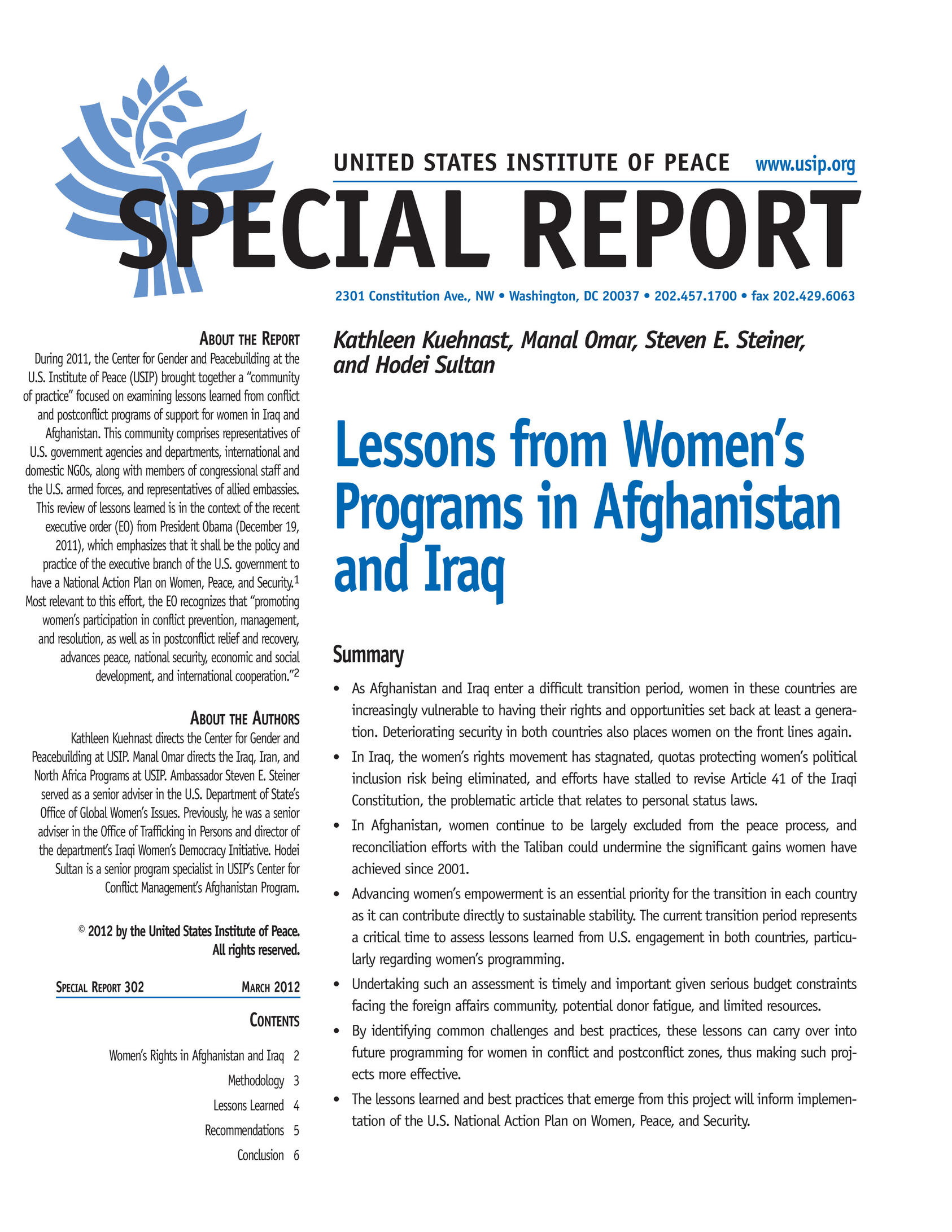Lessons from Women's Programs in Afghanistan and Iraq
Despite years of efforts aimed at expanding women’s rights and opportunities in Iraq and Afghanistan, women in those countries face major obstacles in consolidating these gains. Recognizing that women’s empowerment contributes significantly to stability, USIP convened experts to assess what has been learned in developing women’s programs in Afghanistan and Iraq and to establish best practices for future programs in conflict zones.

Summary
- As Afghanistan and Iraq enter a difficult transition period, women in these countries are increasingly vulnerable to having their rights and opportunities set back at least a generation. Deteriorating security in both countries also places women on the front lines again.
- In Iraq, the women’s rights movement has stagnated, quotas protecting women’s political inclusion risk being eliminated, and efforts have stalled to revise Article 41 of the Iraqi Constitution, the problematic article that relates to personal status laws.
- In Afghanistan, women continue to be largely excluded from the peace process, and reconciliation efforts with the Taliban could undermine the significant gains women have achieved since 2001.
- Advancing women’s empowerment is an essential priority for the transition in each country as it can contribute directly to sustainable stability. The current transition period represents a critical time to assess lessons learned from U.S. engagement in both countries, particularly regarding women’s programming.
- Undertaking such an assessment is timely and important given serious budget constraints facing the foreign affairs community, potential donor fatigue, and limited resources.
- By identifying common challenges and best practices, these lessons can carry over into future programming for women in conflict and postconflict zones, thus making such projects more effective.
- The lessons learned and best practices that emerge from this project will inform implementation of the U.S. National Action Plan on Women, Peace, and Security.
About the Report
During 2011, the Center for Gender and Peacebuilding at the U.S. Institute of Peace (USIP) brought together a “community of practice” focused on examining lessons learned from conflict and postconflict programs of support for women in Iraq and Afghanistan. This community comprises representatives of U.S. government agencies and departments, international and domestic NGOs, along with members of congressional staff and the U.S. armed forces, and representatives of allied embassies.
This review of lessons learned is in the context of the recent executive order (EO) from President Obama (December 19, 2011), which emphasizes that it shall be the policy and practice of the executive branch of the U.S. government to have a National Action Plan on Women, Peace, and Security. Most relevant to this effort, the EO recognizes that “promoting women’s participation in conflict prevention, management, and resolution, as well as in postconflict relief and recovery, advances peace, national security, economic and social development, and international cooperation.”
About the Authors
Kathleen Kuehnast directs the Center for Gender and Peacebuilding at USIP. Manal Omar directs the Iraq, Iran, and North Africa Programs at USIP. Ambassador Steven E. Steiner served as a senior adviser in the U.S. Department of State’s Office of Global Women’s Issues. Previously, he was a senior adviser in the Office of Trafficking in Persons and director of the department’s Iraqi Women’s Democracy Initiative. Hodei Sultan is a senior program specialist in USIP’s Center for Conflict Management’s Afghanistan Program.



